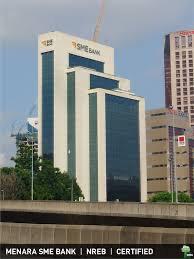KUALA LUMPUR: Small Medium Enterprise Development Bank Malaysia Berhad (“SME Bank”) echoes the government’s aspirations to achieve net zero GHG emissions by 2050 with the unveiling of the bank’s Sustainability Roadmap 2.0, a seven-year plan aimed at addressing climate-related risks and opportunities whilst aligning with its long-term strategic sustainability goals.
The Sustainability Roadmap 2.0 (“Roadmap 2.0”) came on the heels of the successful completion of SME Bank’s initial three-year Sustainability Roadmap from the years 2021–2023 (“Roadmap 1.0”), which saw the culmination of more than RM5.89 billion in approved sustainable financing across key affirmative segments, accounting for approximately 95% or equivalent to RM6.17 billion of the Bank’s total approval for years 2022 and 2023.
This milestone reflects SME Bank’s unwavering commitment to advancing sustainability practices and aligning with national and global sustainability standards.
Datuk Dr. Mohammad Hardee Ibrahim, Acting Group President/Chief Executive Officer of SME Bank, said, “We are proud to be the first development financial institution (“DFI”) in Malaysia to introduce a seven-year Sustainability Roadmap 2.0. It was developed internally by our own people, further underscoring SME Bank’s focus to adopt more ESG practices across key facets of our business, in line with the government’s aspirations to achieve net zero GHG emissions by 2050.
The Roadmap 2.0 is a testament to our strong presence in the sustainability sphere, following the successful completion of the Roadmap 1.0.”
“Riding on this positive momentum, we have set our eyes on a new goal of which we are targeting RM10 billion in sustainable financing and RM1 billion in green/transitioning financing by 2030. This will be anchored by our innovative financing propositions, particularly the RM100 million Dana Kelestarian mandated to SME Bank as announced in the National Budget 2025,” Datuk Dr. Mohammad Hardee elaborated.
Zakiah Mat Esa, Chief Sustainability Officer of SME Bank, said, “The unveiling of the Roadmap 2.0 sets a clear path for the bank’s sustainability journey and is anchored on three phases, with the first phase focusing on alignment with the regulatory requirements, while phase two will spearhead the integration of sustainability practices into the bank’s operations, and phase three will see the optimisation and enhancement of sustainability initiatives for maximum impact and efficiency.
All these will support SME Bank’s goal of achieving carbon-neutral operations by 2030, which aims to gradually reduce fuel consumption and electricity usage emissions throughout the 7-year period. SR2.0 focuses on 7 targets linked to 3 sustainability pillars and 4 long-term goals, ensuring continued stewardship in addressing climate-related risks.”
“The unveiling of the Roadmap 2.0 and the completion of the Roadmap 1.0 are built on three pillars: responsible banking, responsible business practices, and creating social impact. The Roadmap 2.0 also aligns with Bank Negara Malaysia’s (“BNM”) Climate Risk Management and Scenario Analysis (“CRMSA”) Policy Document. We are also proud to have developed our own Sustainability Sukuk Framework (“SSF”), which adheres to international standards set by the International Capital Market Association (“ICMA”), the ASEAN Capital Markets Forum (“ACMF”), and the Sustainable and Responsible Investment (“SRI”) Framework put forth by the Securities Commission,” Zakiah added.
In August 2021, SME Bank successfully issued its first RM500 million sustainability sukuk, which was the first ever sustainability sukuk issued by a DFI in Malaysia. Subsequently, the second tranche amounting to RM500 million has been issued in August 2022 and the third tranche amounting to RM1 billion in May 2023.
Sustainability Roadmap 2.0 Targets RM10 Billion in Sustainable Financing By 2030
The Bank’s Sustainability Sukuk issuances have been recognised with seven accolades. This includes the Best Sustainable and Responsible Investment (“SRI”) Sukuk and Best ASEAN Green Sustainable and Responsible Investment Sukuk by the Alpha South East Asia; the Sustainability Award 2021 by the Malaysian Rating Corporation Berhad (“MARC”); SRI & ESG Deal of the Year Awards by Islamic Finance News; as well as Best Sustainability Sukuk for 2021, Best Sustainability Sukuk-SMEs under the Islamic Finance Awards 2023, and Best Sustainability Sukuk Award 2024 for SME Category by the Asset Triple A.
In view of the robust demand for sustainable financing and ESG-driven initiatives, SME Bank offers a suite of green initiatives, such as green/transition financing for eligible customers, of which the sources of the funds are from Bank Negara Malaysia, i.e., the Low Carbon Transition Facility (“LCTF”) and the High Tech & Green Facility (“HTG”). Additionally, the Bank also offers the Skim Insentif Kelestarian (“SIK”), mobilised under the National Budget 2023, of which RM10 million has been allocated to facilitate SMEs capacity building in embracing the ESG principles.
Echoing SME Bank’s mandated role in providing value beyond financing, the Bank has trained over 1,508 SMEs under SIK phase 1 from the period of July 2023–JJune 2024 via its subsidiary, Centre for Entrepreneur Development and Research Sdn. Bhd. (“CEDAR”).
At present, SME Bank is in the midst of completing phase 2, which began in January 2024, where 330 of the initial 1,508 participants are entrenched further in ESG skills across various modules, namely Materiality Assessment, Carbon Accounting, and Forming a Sustainable Action Plan. This is targeted to be completed by December 2024.


